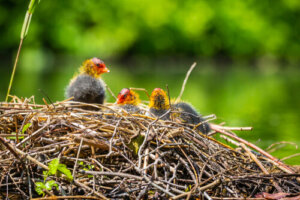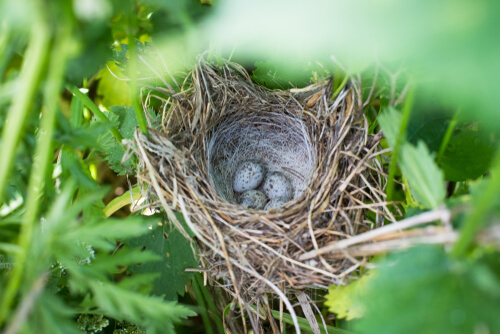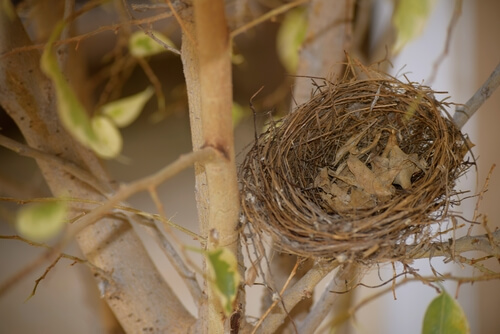What Should I Do if I Find an Abandoned Nest?


Written and verified by the lawyer Francisco María García
If you were ever to find an abandoned nest, would you know what to do about the situation? If there are eggs or chicks in it, then it gets even more complicated! You want to help but have no idea what to do. Here are some guidelines to help you make the right decisions.
The lives of wild birds are completely different from our own. However, there are a few things to understand: first of all, just because the nest looks abandoned doesn’t mean it is. Don’t rush into any action; if you want to help, observe first.
How to tell an abandoned nest
There’ll rarely be eggs or young in an abandoned nest unless the mother has been attacked by a predator. Female birds don’t abandon their nest; they’re probably simply foraging for food for themselves or their chicks. The mother’s absence usually lasts no more than half an hour; after that time, something may have happened.
The presence of foxes, cats, or predators in the vicinity could mean that the parents were attacked. Otherwise, the birds will be nearby watching the nest constantly while feeding. In that case, you shouldn’t approach or touch the nest, eggs, or young.
Bird eggs require a constant temperature. If you get too close to the nest, the mother will move away and the eggs will lose their warmth. For birds that nest on the ground, the vulnerability is even greater.
For these reasons, it’s difficult to recognize an abandoned nest with the naked eye. It’s best to stay away from areas where you know there may be nests; scaring the mother would be a tragedy for the eggs.

What do I do if I find that it is an abandoned nest?
If the abandoned nest has eggs in it, it’s almost impossible to save them. The shells need a specific temperature, abundant humidity and continuous movement in order to hatch. This can only be achieved with specialized tools, and so, in this case, you won’t be able to do anything.
If there are chicks, you may be able to help them. However, it’s important that you stay at a safe distance for a few minutes to make sure that the parents haven’t been able to return home.
It’s common to find chicks far from their nests. After storms or windy days, the chicks may fall out of the nest. Even if it hasn’t rained or been windy, sometimes the little ones just go out to explore the world.
Is it good to intervene?
Intervening in the lives of birds would, in the vast majority of cases, be very unwise. In Europe, a campaign called ‘Spring Alive’ has been set up to advise people not to take chicks away if they’re found outside their nests.
This campaign is based on informing people what to do if they find orphaned chicks. First of all, they tell us that these chicks, for the most part, aren’t orphaned or lost. They’re simply learning to fly; if humans approach them, it could complicate the work of the parents, who’ll stop helping them for fear of the threat.

What to do if I find an abandoned chick?
Actually, the word here wouldn’t be abandoned, but rather ‘lost’. If they fall out of the nest and are too small, it’s sometimes difficult for them to return home. In the city, these accidents are frequent for birds; the best thing to do would be to try to put it somewhere safe from cars where its parents can help it.
Once in a safe place, you can check whether or not its parents are looking for it. If not, taking it to an animal shelter would be the wisest thing to do. If you do pick it up, it’s important that you treat it with extreme gentleness, as its feathers can be very fragile.
The second issue is food for the baby bird. Actually, pieces of biscuit or bread aren’t recommended; special food is needed to give them the nutrients they need. Thirdly, it’s preferable not to give them water, or to give it in very small droplets. If water enters their beak holes they can suffer pneumonia.
Heat is another indispensable requirement to keep a small chick alive. Toilet paper cut into soft strips can be a good option.
It may seem very tempting to take it home and raise it on your own. However, keep in mind that not all bird species cope well with the stress of captivity. Sometimes it’s best to let nature take its course, because you won’t be able to help these animals in all cases.
If you were ever to find an abandoned nest, would you know what to do about the situation? If there are eggs or chicks in it, then it gets even more complicated! You want to help but have no idea what to do. Here are some guidelines to help you make the right decisions.
The lives of wild birds are completely different from our own. However, there are a few things to understand: first of all, just because the nest looks abandoned doesn’t mean it is. Don’t rush into any action; if you want to help, observe first.
How to tell an abandoned nest
There’ll rarely be eggs or young in an abandoned nest unless the mother has been attacked by a predator. Female birds don’t abandon their nest; they’re probably simply foraging for food for themselves or their chicks. The mother’s absence usually lasts no more than half an hour; after that time, something may have happened.
The presence of foxes, cats, or predators in the vicinity could mean that the parents were attacked. Otherwise, the birds will be nearby watching the nest constantly while feeding. In that case, you shouldn’t approach or touch the nest, eggs, or young.
Bird eggs require a constant temperature. If you get too close to the nest, the mother will move away and the eggs will lose their warmth. For birds that nest on the ground, the vulnerability is even greater.
For these reasons, it’s difficult to recognize an abandoned nest with the naked eye. It’s best to stay away from areas where you know there may be nests; scaring the mother would be a tragedy for the eggs.

What do I do if I find that it is an abandoned nest?
If the abandoned nest has eggs in it, it’s almost impossible to save them. The shells need a specific temperature, abundant humidity and continuous movement in order to hatch. This can only be achieved with specialized tools, and so, in this case, you won’t be able to do anything.
If there are chicks, you may be able to help them. However, it’s important that you stay at a safe distance for a few minutes to make sure that the parents haven’t been able to return home.
It’s common to find chicks far from their nests. After storms or windy days, the chicks may fall out of the nest. Even if it hasn’t rained or been windy, sometimes the little ones just go out to explore the world.
Is it good to intervene?
Intervening in the lives of birds would, in the vast majority of cases, be very unwise. In Europe, a campaign called ‘Spring Alive’ has been set up to advise people not to take chicks away if they’re found outside their nests.
This campaign is based on informing people what to do if they find orphaned chicks. First of all, they tell us that these chicks, for the most part, aren’t orphaned or lost. They’re simply learning to fly; if humans approach them, it could complicate the work of the parents, who’ll stop helping them for fear of the threat.

What to do if I find an abandoned chick?
Actually, the word here wouldn’t be abandoned, but rather ‘lost’. If they fall out of the nest and are too small, it’s sometimes difficult for them to return home. In the city, these accidents are frequent for birds; the best thing to do would be to try to put it somewhere safe from cars where its parents can help it.
Once in a safe place, you can check whether or not its parents are looking for it. If not, taking it to an animal shelter would be the wisest thing to do. If you do pick it up, it’s important that you treat it with extreme gentleness, as its feathers can be very fragile.
The second issue is food for the baby bird. Actually, pieces of biscuit or bread aren’t recommended; special food is needed to give them the nutrients they need. Thirdly, it’s preferable not to give them water, or to give it in very small droplets. If water enters their beak holes they can suffer pneumonia.
Heat is another indispensable requirement to keep a small chick alive. Toilet paper cut into soft strips can be a good option.
It may seem very tempting to take it home and raise it on your own. However, keep in mind that not all bird species cope well with the stress of captivity. Sometimes it’s best to let nature take its course, because you won’t be able to help these animals in all cases.
All cited sources were thoroughly reviewed by our team to ensure their quality, reliability, currency, and validity. The bibliography of this article was considered reliable and of academic or scientific accuracy.
- Department Wildlife & Fisheries Louisiana. (2021) I FOUND A BABY BIRD…NOW WHAT?. Recuperado el 20 de mayo de 2022, disponible en: https://www.wlf.louisiana.gov/assets/Resources/Publications/Wildlife_Rehabilitation/found_baby_bird.pdf
- Jasper County Conservation Board (2008) ARE YOU A BIRDNAPPER?. You Found a Baby Bird on the Ground…. Now What?. Recuperado el 20 de mayo de 2022, disponible en: https://www.co.jasper.ia.us/DocumentCenter/View/128/What-should-I-do-if-I-find-a-Baby-Bird-PDF
This text is provided for informational purposes only and does not replace consultation with a professional. If in doubt, consult your specialist.








